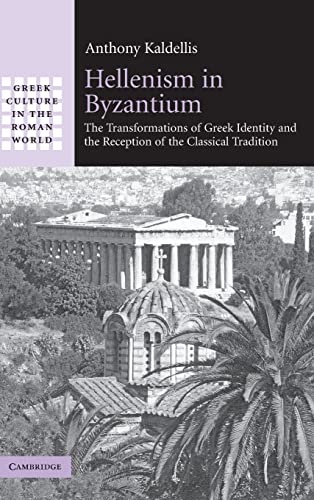Verwandte Artikel zu Hellenism in Byzantium: The Transformations of Greek...
Hellenism in Byzantium: The Transformations of Greek Identity and the Reception of the Classical Tradition (Greek Culture in the Roman World) - Hardcover

Inhaltsangabe
This text was the first systematic study of what it meant to be 'Greek' in late antiquity and Byzantium, an identity that could alternatively become national, religious, philosophical, or cultural. Through close readings of the sources, Professor Kaldellis surveys the space that Hellenism occupied in each period; the broader debates in which it was caught up; and the historical causes of its successive transformations. The first section (100–400) shows how Romanisation and Christianisation led to the abandonment of Hellenism as a national label and its restriction to a negative religious sense and a positive, albeit rarefied, cultural one. The second (1000–1300) shows how Hellenism was revived in Byzantium and contributed to the evolution of its culture. The discussion looks closely at the reception of the classical tradition, which was the reason why Hellenism was always desirable and dangerous in Christian society, and presents a new model for understanding Byzantine civilisation.
Die Inhaltsangabe kann sich auf eine andere Ausgabe dieses Titels beziehen.
Über die Autorin bzw. den Autor
Anthony Kaldellis is Professor of Greek and Latin at The Ohio State University. He has published many articles and monographs on late antiquity and Byzantium, and is currently completing a related book on the subject of the Christian Parthenon. His most recent titles are Mothers and Sons, Fathers and Daughters: The Byzantine Family of Michael Psellos (2006) and Procopius of Caesarea: Tyranny, History and Philosophy at the End of Antiquity (2004).
„Über diesen Titel“ kann sich auf eine andere Ausgabe dieses Titels beziehen.
EUR 4,50 für den Versand innerhalb von/der Deutschland
Versandziele, Kosten & DauerNeu kaufen
Diesen Artikel anzeigenEUR 5,74 für den Versand von Vereinigtes Königreich nach Deutschland
Versandziele, Kosten & DauerSuchergebnisse für Hellenism in Byzantium: The Transformations of Greek...
Hellenism in Byzantium
Anbieter: SKULIMA Wiss. Versandbuchhandlung, Westhofen, Deutschland
Zustand: Wie Neu. Zustandsbeschreibung: textsauberes Exemplar mit leichten Gebrauchsspuren, leicht berieben/clean text pages, minor traces of use, slightly rubbed. The Transformations of Greek Identity and the Reception of the Classical Tradition. Through close readings of the sources, Kaldellis surveys the space that Hellenism occupied in each period; the broader debates in which it was caught up; and the historical causes of its successive transformations. The first section (100-400) shows how Romanisation and Christianisation led to the abandonment of Hellenism as a national label and its restriction to a negative religious sense and a positive, albeit rarefied, cultural one. The second (1000-1300) shows how Hellenism was revived in Byzantium and contributed to the evolution of its culture. XI,468 Seiten, gebunden (Greek Culture in the Roman World/Cambridge University Press 2007). Statt EUR 117,50. Gewicht: 896 g - Gebunden/Gebundene Ausgabe - Sprache: Englisch. Artikel-Nr. 101603
Anzahl: 1 verfügbar
Hellenism in Byzantium; The Transformations of Greek Identity and the Reception of the Classical Tradition
Anbieter: DogStar Books, Lancaster, PA, USA
Hardcover. Zustand: Near Fine. Zustand des Schutzumschlags: Very Good+. Third Printing. Greek Culture In The Roman World; Large 8vo 9" - 10" tall; 482 pages; 2009 Cambridge University Press. HC/DJ 3rd printing. Snugly bound and neat in original pictorial dust jacket. Contents bright and fresh with no marks. Mild shelf tap bottom front corner of the cover and mild shelf evidence to jacket edges. NF/VG++. Artikel-Nr. 56949
Anzahl: 1 verfügbar
Hellenism in Byzantium: The Transformations of Greek Identity and the Reception of the Classical Tradition (Greek Culture in the Roman World)
Anbieter: Reuseabook, Gloucester, GLOS, Vereinigtes Königreich
hardcover. Zustand: Used; Very Good. Dispatched, from the UK, within 48 hours of ordering. Though second-hand, the book is still in very good shape. Minimal signs of usage may include very minor creasing on the cover or on the spine. Artikel-Nr. CHL10454936
Anzahl: 1 verfügbar
Hellenism in Byzantium: The Transformations of Greek Identity and the Reception of the Classical Tradition (Greek Culture in the Roman World)
Anbieter: Ria Christie Collections, Uxbridge, Vereinigtes Königreich
Zustand: New. In. Artikel-Nr. ria9780521876889_new
Anzahl: Mehr als 20 verfügbar
Hellenism in Byzantium : The Transformations of Greek Identity and the Reception of the Classical Tradition
Anbieter: AHA-BUCH GmbH, Einbeck, Deutschland
Buch. Zustand: Neu. Druck auf Anfrage Neuware - Printed after ordering - This text was the first systematic study of what it meant to be 'Greek' in late antiquity and Byzantium, an identity that could alternatively become national, religious, philosophical, or cultural. Through close readings of the sources, Professor Kaldellis surveys the space that Hellenism occupied in each period; the broader debates in which it was caught up; and the historical causes of its successive transformations. The first section (100-400) shows how Romanisation and Christianisation led to the abandonment of Hellenism as a national label and its restriction to a negative religious sense and a positive, albeit rarefied, cultural one. The second (1000-1300) shows how Hellenism was revived in Byzantium and contributed to the evolution of its culture. The discussion looks closely at the reception of the classical tradition, which was the reason why Hellenism was always desirable and dangerous in Christian society, and presents a new model for understanding Byzantine civilisation. Artikel-Nr. 9780521876889
Anzahl: 1 verfügbar

